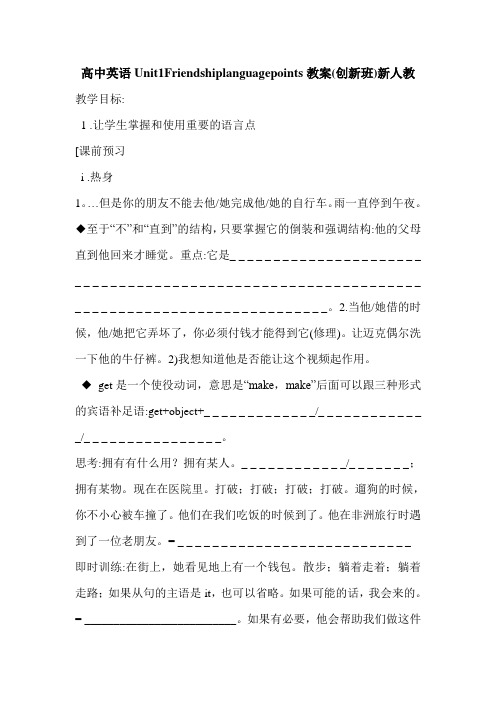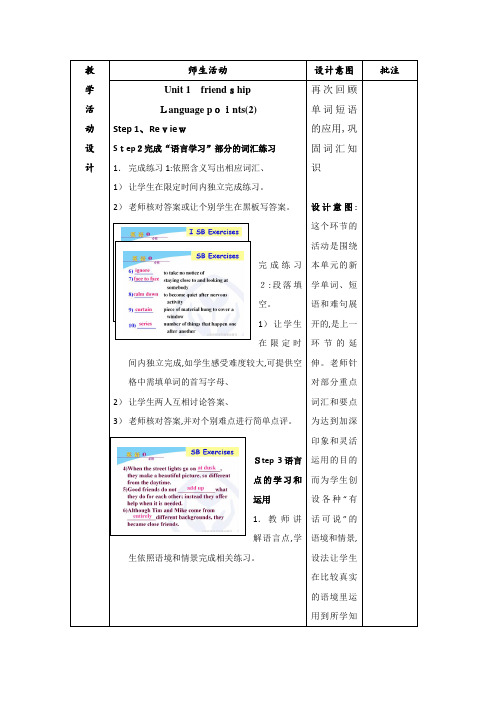Unit 1 Friendship-Language points[人教新课标必修一课件]
- 格式:ppt
- 大小:3.10 MB
- 文档页数:42


![新人教版必修一-Unit-1-Friendship-Important-Language-Points[优秀教案]](https://img.taocdn.com/s1/m/217247d4804d2b160b4ec0e3.png)
Unit 1 FriendshipPeriod 3Important Language Points整体设计从容说课This is the third teaching period of this unit. The teacher should first check the students’ homework and offer chances for the students to review what they learned in the second period.The emphasis in this period will be put on the important new words, expressions and sentence patterns. In order to make the students understand these important points tho-roughly, the teacher can first get the students to understand their meanings in the context, then give some explanations about them, and later offer some practices to let the students know their usages. At last make the students do more exercises for consolidation.The teacher should be expected to carefully design class activities to encourage the students to be active in class so as to enable the students to grasp and use these language points both orally and in written form. Make sure the students are willing to take part in the activities in class and get ready to cooperate with each other. In doing so, the students can learn, grasp and use these important language points well.教学重点Enable the students to grasp the usages of such important new words and expressions as share, crazy, dare, series, on purpose, in order to, and so on.教学难点How to enable the students to grasp the usages of dare and in order to and understand some difficult and long sentences.教学方法1. Discussing, summarizing and practicing2. Cooperative learning教具准备The multimedia and other normal teaching tools三维目标Knowledge aims:1. Get the students to learn and grasp some important new words and expressions:add ignore concern cheat share series crazy dare suffer advice communicate add up calm down have got to be concerned about go through hide away set down a series of on purpose in order to face to face according to get along with fall in love with join in2. Get the students to understand some useful sentence patterns:1)Your friend, who doesn’t work hard, asks you to help him or her to cheat in the exam by looking at your paper, what will you do? (the Attributive Clause)2)I don’t want to set down a series of facts in a diary as most people do, but I want this diary itself to be my friend. (as. . . )4)I wonder if it’s because I haven’t been able to be outdoors for so long time that I’ve grown so crazy about everything to do with nature. (I wonder if/whether. . . ; so. . . that. . . )5). . . I stayed awake on purpose until half past eleven one evening in order to have a good look at the moon for once by myself. (stay+adj. ; in order to do)Ability aims:1. Enable the students to use some useful words and expressions correctly.2. Enable the students to learn how to understand new words, expressions and difficult sentences according to the context.Emotional aims:Develop the s tudents’ spirit of cooperation and teamwork.教学过程设计方案(一)→Step 1 Revision1. Check the homework exercises.2. Ask some students to talk about their friends and what qualities and behavior make good friends. Also may ask them to talk about Anne’s best frie nd, her diary.→Step 2 Reading and exerciseGet the students to try to find out the words and expressions as quickly as possible in the related parts and let them learn some important new words and expressions by studying their contexts, clues and word-formation.The teacher shows the following on the screen.1. Find the words and expressions in Warming Up. Make sure that they have the same meanings given below.1)to join numbers, amount, etc. so as to find the total2)to act in a dishonest way in order to win; to take from (someone)in a dishonest way3)be worried about4)feeling unhappy about something; worried; anxious5)not to take notice of6)to make (of a living beings)calm7)must8)not fastened; tied up, shut up, etc. ; free from control2. Fill in the blanks with the words and expressions in the Reading to complete the following sentences.1)Friends are just the people who______________ your happiness and sorrow.2)You really don’t know what we______________ while working on the farm.3)I have______________ everything that happened, as I remember it.4)She______________ singing and dancing.5)Tom did something wrong to his brother, but he said he didn’t do that______________.6)______________ catch the first bus, she got up early this morning.7)The na ughty boy______________ and his parents didn’t find him anywhere.8)A deep blue sky, white clouds, green trees and red flowers and fresh air held me_______________ .→Step 3 CheckingExplain the problems the students meet while checking the answers.Suggested answers:1. 1)add up2)cheat3)be concerned about4)upset5)ignore6)calm down7)have (got) to8)loose2. 1)share2)went through3)set down4)is crazy about5)on purpose6)In order to 7)hid away8)entirely in their power→Step 4 Language Points1. add vt. & vi.1)to put something with something else or with a group of other things加;添;增加Do you want to add your name to the list?你愿意把名字添到名单上吗?Whisk the egg and then add the flour.打好鸡蛋以后再加面粉。

高中英语Unit1Friendshiplanguagepoints教案(创新班)新人教教学目标:1 .让学生掌握和使用重要的语言点[课前预习i .热身1。
…但是你的朋友不能去他/她完成他/她的自行车。
雨一直停到午夜。
◆至于“不”和“直到”的结构,只要掌握它的倒装和强调结构:他的父母直到他回来才睡觉。
重点:它是_ _ _ _ _ _ _ _ _ _ _ _ _ _ _ _ _ _ _ _ _ _ _ _ _ _ _ _ _ _ _ _ _ _ _ _ _ _ _ _ _ _ _ _ _ _ _ _ _ _ _ _ _ _ _ _ _ _ _ _ _ _ _ _ _ _ _ _ _ _ _ _ _ _ _ _ _ _ _ _ _ _ _ _ _ _ _ _ _ _。
2.当他/她借的时候,他/她把它弄坏了,你必须付钱才能得到它(修理)。
让迈克偶尔洗一下他的牛仔裤。
2)我想知道他是否能让这个视频起作用。
◆get是一个使役动词,意思是“make,make”后面可以跟三种形式的宾语补足语:get+object+_ _ _ _ _ _ _ _ _ _ _ _ _/_ _ _ _ _ _ _ _ _ _ _ _ _/_ _ _ _ _ _ _ _ _ _ _ _ _ _ _ _。
思考:拥有有什么用?拥有某人。
_ _ _ _ _ _ _ _ _ _ _ _/_ _ _ _ _ _ _;拥有某物。
现在在医院里。
打破;打破;打破;打破。
遛狗的时候,你不小心被车撞了。
他们在我们吃饭的时候到了。
他在非洲旅行时遇到了一位老朋友。
= _ _ _ _ _ _ _ _ _ _ _ _ _ _ _ _ _ _ _ _ _ _ _ _ _ _ _ 即时训练:在街上,她看见地上有一个钱包。
散步;躺着走着;躺着走路;如果从句的主语是it,也可以省略。
如果可能的话,我会来的。
= __________________________。
如果有必要,他会帮助我们做这件事。


必修一Unit1 friendshipReading and language pointsTeaching aims:1. to know about the story of Anne’ s Diary2.to promote the Ss’ abilities of reading comprehension3.to learn about the following words and expressions:4.readon; list; go through; hide away; set down; a series of; outdoors; crazy; spellbound; on purpose;dare; happen to do sth.; It’ stimthe thafirst⋯Teaching methods:5.reading and discussion6.cooperative learning and speakingTeaching materials:Reading, ComprehendingTeaching procedures:Step One: Leading-inAsk their opinions on the question mentioned in the assignment of last period.Step Two: Pre-readingLet the Ss think about the questions in Pre-reading, and express their own views to the whole class.Step Three: ReadingAsk the Ss to look at the pictures and the heading, guess what the text might be about.Get the Ss to skim the passage and answer the following questions:What’ s Anne’ s best friend?What does her diary mainly talk about?1. Anne ’ s best friend is her diary.2. It’ s about Anne’ s feeling of hiding away. She especially missed going outside and enjoying nature.Let the Ss read the passage and discuss the following questions:Imagine what it might be like if they had to stay in their bedroom for a whole year. You could not leave it even togo to the WC or get a cup of tea. How would they feel?If you are only allowed to have five things with you in the hiding place because there is very little room, what would you choose?Try to guess why the windows had to stay closed.Guess the meanings of the word“ crazy” and“ spellbound” according to the context. Step Four: Discussing the styleAsk the Ss:What do you think is the purpose of this passage? Why did Anne write it?Do you think it is successful? Do you understand Anne’ s feelings?What is Anne’ s tone? In other words, is the authorangry, sad, happy or thrilled?What is Anne’ s point of view? Do you agree with it? If so, why? If not, why not?Step Five: Listen to the text and comprehend itStep Six: Language points1. go throughto examine carefully认真阅读或研究eg. I went through the students’papers last night.to experience经历;遭到或忍耐eg. You really don’ t know what we went through while working on this project.2.hide awayvi. to go somewhere where you hope you will not be seen or found闪避;隐藏hide away + 地址eg. The thief hid away in a friends house for several’ weeks after the robbery.to put or keep sth. /sb. in a place where they / it can hide away sth. / hide sth. awayeg. Why do you hide your thoughts away from me?藏’;t隐be蔽seen orfound3.set down]write down写下;记下eg. I’ ll set downhe tstory as it was told to me. put down放下;搁下set down sth. /set sth. downeg.He set down a basket on the ground. 4. series n.(单复数同形)a series of 一串的;一系列的5 .crazy adj.mad, foolish 狂的;愚笨的It is crazy of sb. to do sth. = sb be crazy to do sth.eg. It ’ s crazy to go out in such hot weather.wildly excited; very interested 狂的;入迷的grow / be crazy about sb. / sth.eg. The boys are crazy about the girl singer.like crazy 似的;拼死地eg. He talked like crazy; I couldn ’ t understand what he said.6. I wonder if it’ s because I haven ’ tt been able to be outdoors for so. long that⋯*I wonder if / whether⋯eg. I wonder if you can help me?*It ’ s because⋯it is 后的表原由的从句中,只好用 because来引,不可以用 since 或 as.eg. Why did you go to school on foot?It is because my bike had broken.7. spellbind v. to hold the complete attention of 吸引人,迷人;使入迷 eg. Thechildren watched spellbound as the magician took rabbits from his hat. 8. stayv. to continue to be in a particular state or situatioin系,表是状。
Unit 1 FriendshipPeriod 4 Language pointsI。
Words and expressions1.Add up your score and see how many points you can get。
把你的得分加起来, 看一看你能得多少分。
add up加起来,合计add to增加add.。
to。
.往……里添加……add up to 总计;加起来等于add that。
补充说,接着说……例句:⑴Add up all the money I owe you。
把我欠你的钱都加在一起。
⑵If we add these marks up, we’ll get a total of 90.如果我们把这些分数加起来,总数就有九十分了。
⑶The travelling expenses added up to 10,000 yuan。
旅游开支总数达一万元。
⑷The bad weather added to our difficulty。
坏天气增加了我们的困难。
⑸Please add some sugar to the milk. 请往牛奶里加些糖.⑹All his schooling added up to no more than one year。
他所受的学校教育加起来只有一年.⑺He added that he would return a week later。
他接着说,他们一周以后会回来。
2. You will ignore the bell and go somewhere quiet to calm your friend down。
(P1)calm down / calm sb down(使)镇静/平静下来⑴Look, calm down! We will find her。
喂,镇静一点!我们会找到她的.⑵He took a few deep breaths to calm himself down。